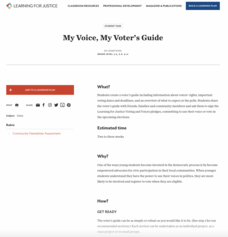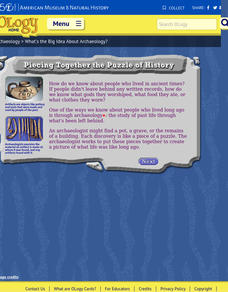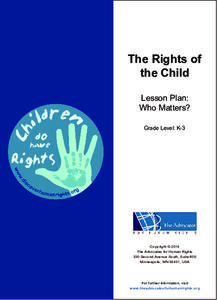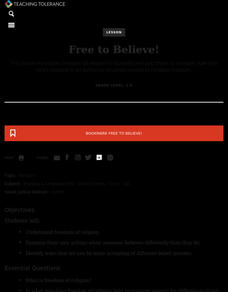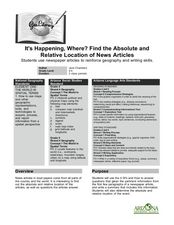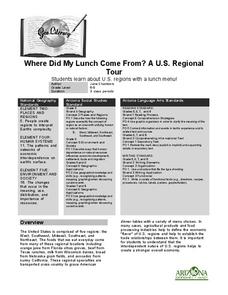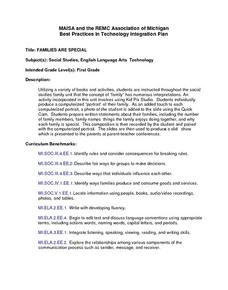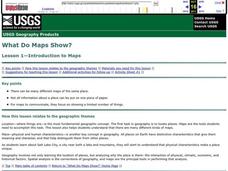New York State Education Department
Global History and Geography Examination: January 2016
What do the Inca Civilization, Wittenburg Church, and India's economy in the Mughal Period have in common? The well-rounded standardized test challenges scholars to remember all of them. They use different graphics and maps to answer...
New York State Education Department
Global History and Geography Examination: January 2014
Scholars write an informational essay with a practice examination. The resource includes comprehensive multiple-choice questions dealing with everything from the creation of the European Union to changes in oil prices across the globe.
Bully Free Systems
Bully Free Lesson Plans—Second Grade
Two lessons shed light on bullying in hopes to create a bully-free zone in your classroom. The first lesson defines bullying and allows scholars to reflect on their behavior. The second lesson focuses on choices and consequences. Both...
Syracuse University
World War I
World War I was known for its gruesome battlefields and horrific injuries. Using photographs from a battlefield surgeon's scrapbook, scholars see first-hand what life was like in the trenches. After creating a timeline of the war using...
K20 Learn
Bavaria Has Issues...Experimental Components
Do you want to be a detective by analyzing situations? An engaging lesson plan provides young historians with the tools to help them understand the difference between data types and how to analyze them to draw conclusions. Scholars...
New York State Education Department
Global History and Geography Examination: January 2010
Agriculture was more revolutionary than some might think. Using a primary source set—including photos of artifacts from Mesopotamia and an amusing comic—learners consider the impacts of the neolithic, agricultural, and green revolutions....
American Battlefield Trust
Contraband Camp
An educational lesson plan explores the plight of African Americans escaping slavery during the Civil War. Learners view a presentation and analyze primary documents and images to understand the purpose of contraband camps and how they...
Stanford University
Edward Curtis Photographs
A picture is worth a thousand words. The photos of Edward Curtis capture the life and culture of Native American Tribes during the early part of the twentieth century. A presentation first gives background information on Edward Curtis...
Teaching Tolerance
My Voice, My Voter's Guide
Class members may be too young to vote, but that doesn't mean their voices are silent! After researching key information, such as policies for registering to what to expect at the polls, young scholars create and present election guides...
US Department of Commerce
Apportionment: Grades 3-4
Apportionment is a big word for young pupils. Use a helpful cartoon video and worksheet with data set to help them understand how the census fuels representative democracy. After examining how the census determines the number of seats a...
Western Justice Center
Culture and Identity
To conclude a study of conflict resolution, class members watch and discuss a series of five videos that frame the conversation in terms of culture and identity, understanding bias, oppression, and interpersonal biases.
American Museum of Natural History
What's the Big Idea About Archeology
The American Museum of Natural History offers a website sure to engage young anthropologists. Learners can dig into a site that offers an explanation of the field of archaeology, the kinds of questions archaeologists ask that launch...
Advocates for Human Rights
The Rights of the Child
Dr. Seuss wrote " A person's a person, no matter how small." The elementary resource uses Dr. Seuss's book Horton Hears a Who to explore children's rights in an engaging way. Young academics listen to the story, participate in group...
Teaching Tolerance
Free to Believe!
The United States: One nation with countless religions. An interesting lesson focuses on the freedom of religion protected under the First Amendment. Academics learn why it is important to protect all religions, why there is a separation...
DocsTeach
Evaluating Perspectives on Westward Expansion
Although popular culture tells the story of the American West simplistically, its reality is far more complex. Native American tribes—while already on the land—didn't have the same interests, and conflicts between white settlers and...
Curated OER
More Simulations: Decisions, Decisions! and Flat Stanley
Students investigate the concepts related to instructing students using Flat Stanley in the Social Studies classroom. They examine the different instructional materials and are shown how to present the material to class. The focus is...
Curated OER
It's Happening, Where? Find the Absolute and Relative Location of News Articles
Pupils read newspaper articles. In this social studies instructional activity, students locate the latitude and longitude of the location where the news article takes place. Pupils write a summary of the news article.
Curated OER
Where Did My Lunch Come From? A U.S. Regional Tour
Students explore the regions from which their food comes. In this social studies lesson, students identify the different agricultural products that are found in the major regions of the United States. Students create a lunch menu.
Curated OER
Rivers that Flow from the Continental Divide: The Journey of Two Rivers
Students explore river routes. In this social studies lesson, students trace the route of a river from its source and discuss the Continental Divide. Students draw the route the river takes and name the states it flows through. Students...
Curated OER
A River Through Time
Learners explore how construction of a dam on the Gila River affected the lifestyle of Pima Indians. In this social studies lesson, students locate the Gila River and the Coolidge Dam. Learners record dates on a timeline and discuss how...
Curated OER
Families are Special
First graders are instructed throughout the social studies family unit that the concept of "family" has numerous interpretations. An activity incorporated in this unit involves using Kid Pix Studio.
Curated OER
Introduction to Maps
Students develop their map skills. In this geography lesson, students participate in an activity that requires them to survey their social studies book in order to find different types of maps and purposes for their uses.
Curated OER
Ohio Census 1990 and 2000
Students explore the Ohio census numbers in 1990 and 2000. In this social studies lesson, students use the census data to answer questions.
Curated OER
Thanksgiving Timelines
Fifth graders investigate the significant people, events, and developments in the early history of the United States. They examine a timeline in their social studies textbook and discuss how a timeline works. In pairs they create a...










